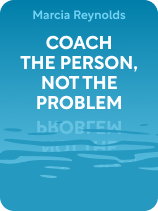

This article is an excerpt from the Shortform book guide to "Coach the Person, Not the Problem" by Marcia Reynolds. Shortform has the world's best summaries and analyses of books you should be reading.
Like this article? Sign up for a free trial here.
What are the core life coaching skills? How can you do your job more effectively by learning these skills?
In Coach the Person, Not the Problem, Marcia Reynolds describes the most important life coaching skills that separate the great from the good. According to her, there are two core skills every life coach should learn to be successful in their field.
Read on to learn the two life coaching skills you should master as a coach, according to Reynolds.
Required Life Coaching Skills
According to Marcia Reynolds, coaching is a partnership aimed at helping clients root out underlying reasons for why they feel stuck and helping them to move forward in their professional or personal lives. A coach’s role is to support clients in a deep investigative process to identify and challenge assumptions that underlie their beliefs and limit their progress—not be an expert who doles out advice or solves clients’ problems from on high. She says that coaches view clients as capable of making change when given the proper support and tools. As you prepare to coach, you should be attuned to two life coaching skills that will help you do your job more effectively: Being in the correct mental state and being an active, empathic listener.
Skill 1: Be in the Correct Mental State
Reynolds says that strong coaches are fully “in the moment” in their sessions. This means a) being constantly attuned to what your client is experiencing, what you’re experiencing, and the dynamic between you and b) allowing and welcoming whatever arises in your session to unfold organically. Being in the moment allows you to meaningfully connect with your client and fosters an atmosphere that encourages them to be open.
(Shortform note: Experts expand upon Reynolds’s recommendation to be mindful of your client’s and your individual and shared experience, asserting that when you “hold space” for your client, yourself, and the coaching process, you build a vital three-way partnership. Holding space means taking the time to honor and reflect upon your client’s work without attachment or the feeling that you have to rush their—or your—process to fit a particular coaching model. By giving your client and yourself the space necessary to reflect together, you show respect for and strengthen your journey together.)
For this life coaching skill, Reynolds says you can learn to be in the moment during each coaching session by consciously reminding yourself to:
- Choose one or two emotions that will best serve your client and keep you focused and present. For example, if your client is temperamentally anxious and negative, you might choose to be calm and positive.
- Be a partner who sees your client’s strengths.
Choosing your emotions and focusing on what your client brings to the table will keep you, and them, in a balanced, open state that’s conducive to learning, understanding, and growth.
(Shortform note: Existential-Humanistic (EH) therapy takes a similar approach to the mindful work that Reynolds advocates for in coaching. A core practice of EH therapists—who believe in the inherent worth of all clients, including those deemed too wounded to heal—is being fully engaged in the present moment during sessions. One way they do this is by embracing silence unless or until they or their client have something relevant to offer, which encourages a deeper focus on clients’ immediate experience. EH therapists strive to remain present as clients work through the unknown to greater clarity, trusting that the necessary answers will reveal themselves through revelations that arise in the moment.)
Reynolds says that when you find your mind wandering during sessions, you can recenter yourself and connect with your physical body by releasing tension from areas where you feel it. For example, relax your shoulders or unclench your fists or jaw. You can also draw your attention to details of objects immediately in front of you. For example, notice the shape and color of the leaves on a plant in the room, or study the pattern on the rug at your feet. If you find your mind wandering, think to yourself, “Ah, my mind’s wandering,” then return to noticing the physical objects in front of you.
(Shortform note: Experts say that staying focused on the subject at hand is an important skill not just for life coaches, but for clients. Clients can avoid becoming distracted during sessions by taking a minute to be still before each meeting, turning off their phones, and taking notes on paper. They can also practice being present in their day-to-day life, which will carry into their coaching sessions. Some practices to improve this include putting your hands in water and focusing on how it feels on your fingertips and palms, picking up and noticing the weight and size of different objects, and holding a piece of ice and thinking about how it feels as it melts.)
Skill 2: Be an Active, Empathic Listener
Reynolds says that in addition to being mindful during coaching sessions, the next life coaching skill you should learn is to be an active listener who carefully observes and works to understand and validate what clients are saying. Different from casual listening—a process that centers around information gathering and often ends with giving answers to surface-level problems—active, empathic listening allows you to develop deeper connections and communicate to your client that you care about them. This bolsters your relationship and helps you grow and learn from one another.
(Shortform note: Science supports Reynolds’s call to be an active, empathic listener: In one study, research subjects rated evaluators who they perceived as actively listening to them more favorably, and neural activity in their brain was enhanced when they perceived they were being listened to actively—suggesting that they processed the action as rewarding.)
Reynolds says you can be an active, empathic listener during sessions by centering yourself, letting go of preconceived notions and judgments about your client, and being genuinely curious about them. To do this, when you enter coaching sessions you should:
- Clear your brain of random thoughts.
- Remind yourself that your goal is to be open and compassionate.
- Release the ideas that you fully know your client, what they’re going to say next, and that your opinion is right and theirs is wrong.
- Trust feelings you get when you notice shifts in your client’s emotions and behavior, which can indicate that something deeper is going on that could benefit from further exploration.
(Shortform note: Therapists say there’s another way to get into an active, empathic listener mindset: Develop your “third ear”. The third ear is the ability to step back in a counseling session and consciously tune into your client’s emotions, your reactions, and the overall feeling of whether you’re in sync or if one of you is distracted or rambling. Developing your third ear grounds you in the reality of the moment, enabling you to be more present and listen in an authentically engaged way. You can cultivate your third ear by observing people in conversation, for example at a park or restaurant, and noticing shifts in their emotional dynamics, like when they agree, disagree, or look engaged or distracted.)
Reynolds notes that it’s particularly important for life coaches to develop a skill for not judging or allowing bias to interfere with their work with clients. You can curb these tendencies by acknowledging that you judge and have biases. Recognizing this truth allows you to stay attuned to and recenter yourself when you’re aware that you’re judging clients during sessions. It will also remind you that your job is not to judge your clients from on high, but to partner with and help them leverage their strengths to achieve their goals.
You can practice tuning into—then letting go of—your judgmental tendencies by:
- Being kind to, rather than criticizing, yourself when you become aware that you’ve just had a judgmental thought (because judging is a normal, human reaction)
- Asking yourself where a judgmental thought came from once you realize you’ve had one
- Welcoming the idea that your judgmental thought isn’t necessarily correct and being open to learning things that could change or correct that thought
(Shortform note: Reynolds says that coaches should acknowledge that they’re judgmental to prevent that judgment from negatively impacting clients’ progress. In Girl, Wash Your Face, Rachel Hollis shows that being judgmental is a universal problem and one that women, in particular, should confront so it doesn’t ruin their friendships. Hollis argues that women should judge less and support each other more by focusing on each other’s hearts, character, and experience rather than hair and clothes. Like Reynolds, Hollis argues that change begins with acknowledging that everyone judges, then recognizing that your opinion is not always the “correct” or the only one out there.)

———End of Preview———
Like what you just read? Read the rest of the world's best book summary and analysis of Marcia Reynolds's "Coach the Person, Not the Problem" at Shortform.
Here's what you'll find in our full Coach the Person, Not the Problem summary:
- The mindsets and skills required of clients and coaches to work together effectively
- The four practices coaches should employ to make the most of coaching sessions
- Why the role of a coach is not to fix surface-level problems






